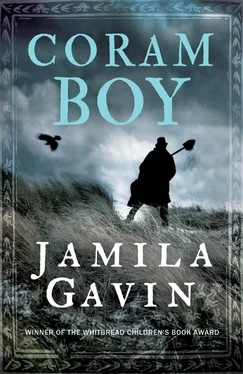Otis reached her door and was about to knock when it opened. A woman holding a flickering taper stood in the doorway taking her leave. Meshak gawped up at her. She was not young and the bright colours of her clothes, her body squeezed in at the waist and bodice, her flounced-up hair and rouged face, were all part of an effort to knock a decade off her age. ‘Ah yes . . . Lady Philomena,’ she spoke in a heavy confidential way, ‘now that young woman is one to watch, Mrs Peebles, you mark my words. There’s powerful talk of goings on up at the house with the tutor. A German, you know and-’ The woman stopped abruptly. ‘What you staring at, you insolent pup?’ she said sharply, pushing Meshak away, but then she saw Otis standing there, a slight smile on his face. She held her taper up as if to see him better. The shadows wavered around them, encircling the flame. ‘Oh! It’s you,’ she simpered. ‘The boy’s got bigger. I didn’t recognise him. I think you have a visitor, Mrs Peebles,’ she called over her shoulder. ‘Good to see you, Otis. I hope you’re keeping in good health. Will you be coming up to Ashbrook this time? We could do with our knives sharpening and a few new pots, perhaps?’ The woman in the doorway tipped her head flirtatiously.
‘Nothing would keep me away, Mrs Lynch.’
‘Goodnight, Mrs Peebles,’ Mrs Lynch called out, without taking her eyes off Otis. ‘See you in the morning.’ As she sidled past, Meshak shrank back in case he received another blow and watched her go, looping her skirts over her free arm as she climbed the narrow winding stairs to the bedrooms above the inn.
‘Sleep well, Mrs Lynch,’ answered Mrs Peebles from within.
‘Mrs Peebles!’ Otis greeted her from the doorway, leaning nonchalantly, one arm up against the lintel as if he held it up.
Meshak peered beneath his father’s arm into the parlour beyond, where a lady draped in a veil sat at a round table. No one crossed Mrs Peebles. She had been born nothing but a bargee’s daughter; no education, no position. But she had such intelligence, such a snake-like ability to target a person’s weaknesses, such an ear for gossip, scandal and innuendo, that people feared her. It was said she had been employed as a spy in her youth – when she was beautiful, and able to mix with any company, especially the foreigners who came through the city – and was clever enough to entrap or compromise anyone targeted by her paymasters. Now she wasn’t beautiful; although she was old enough to be Meshak’s grandmother, it wasn’t age which had spoilt her looks, but smallpox. He sensed his father wince and drop his eyes as she pulled her veil across her ravaged, pitted face.
Pushing Meshak into a corner to sit and wait, Otis strode towards her, smiling that restrained half-smile which usually did more to soften the hearts of women than the effusive lace-handkerchief-sweeping charm of so many men trying too hard to please. He knew she despised them anyway, for if it’s one thing a woman with such a disability can cut through with a knife, it’s cant and false flattery.
He kissed her hand. She waved him to sit down opposite her. The double candlestick with its broad flapping flame favoured him, while leaving her in a kinder shadow from which she could scrutinise her visitor without effort.
Meshak settled on the floor with his arms clasped round Jester. The ale had made him sleepy.
‘What about him?’ Mrs Peebles indicated Meshak.
‘No need to trouble yourself. His body’s got bigger, but his brain is still soft as it always was. He won’t say nothing.’
Meshak knew that his father and Mrs Peebles had been doing business together since before he was born. Otis had just been a lad when she spotted him. He was born a wheeler-dealer, already knowing how to make himself useful, dependable and indispensable. She took him on as a boy and liked to think she turned him into a man – the kind of man she could use and control. She liked to gather young men around her – those she felt she could groom and manipulate and trust to get involved in her various enterprises.
‘I hear they’ve given you a new name,’ she said, pouring out some gin from a large earthenware jug.
‘Pots man, charity man – even Mrs P’s man – so? What’s in a name?’ He shrugged.
‘They are calling you a Coram man. What’s that?’
Meshak looked up. How did she know? He himself had only heard it for the first time today by the river.
Otis shrugged.
‘Come on, Otis, don’t play coy with me. What does it mean?’ demanded Mrs Peebles. Her eyes gleamed at him with intense curiosity. ‘What have you been up to that I don’t know about?’
‘Nothing that you don’t know about, Mrs P.’ Otis leant back, still smiling. ‘It’s the same old business: brats. Just another angle. Haven’t you heard of Coram?’
‘I know of a Thomas Coram, the sea captain. I thought he was in America. Came this way sometimes. Didn’t have anything on him though. Clean as a whistle. Do you mean him?’
‘Look, Mrs P,’ said Otis, leaning forward conspiratorially. ‘I think I may have hit on something good, something which can benefit us both, if we cooperate.’
‘ You have always cooperated with me in the past,’ muttered Mrs Peebles. ‘Are you asking me to cooperate with you ?’ She cackled scornfully.
‘Suit yourself. Yes, it is Captain Coram. He’s in London now. Given up seafaring and turned to good works. He’s something of a benefactor !’ There was derision in his tone as Otis said, ‘Wants to save the poor children of England. He’s set up a hospital, an institution for foundlings. But I tell you something, it’s not just the poor children he’s saving but the brats of the rich. Word has spread about the thousands of pounds being poured into his enterprise to feed, clothe and educate bastards – thousands, Mrs P. Money coming from the wealthy to salve their consciences and purchase their respectability. I saw it for myself. I was in London last year. I saw the rich carriages, the fine weeping ladies hiding their faces behind Spanish lace veils, leaving their illegitimate babies in satin-lined baskets with a pouch of gold coins tucked under their pillows. “Otis,” I said to myself, “if there’s not something to be gained in all this for me, I’ll eat my hat.”’
‘So? And have you turned this to your advantage?’ enquired Mrs Peebles softly. ‘Blackmail?’
‘That – and other sidelines.’ He took another swig of gin straight from the jug. ‘You know things develop for themselves if you let them. I’ve been developing my sidelines.’
Mrs Peebles leant forward into the light. ‘Tell me more.’
Meshak’s head lolled as he drifted into sleep. He thought about Captain Thomas Coram, a charity man like his father. Loves little children. His brain filled with images; dreams overwhelmed him. He saw angels and children soaring among the stars, but he was drowning and, as he drowned, he called out, ‘Save me, save me!’ But no one heard him.
Then there came a great galleon with billowing sails, tossed in an ocean of sky and clouds. Meshak could see the outline of a captain at its helm. ‘Save me, save me!’ he yelled, but his voice was lost in a chorus of singing angels and children, their voices mingling with the gulls as he sank down, down beneath the waves.
He awoke suddenly, just when he thought he had drowned. Jester had jumped to his feet, his body taut, his fur raised, his ears pricked, and he whined softly between bared teeth. Meshak looked around. The room was empty, the candle almost out. His father and Mrs Peebles had gone. In the predawn darkness, when most of the city was finally silent, even the people of the night were subdued. The gambling had ceased, the drunkards were asleep, the servants, lackeys, labourers and traders had all surrendered their limbs and brains to the secret world of the unconscious. Only sailors watching for the dawn tide were up, and the nightwatchmen, huddled near fires in between doing their rounds. They could be heard whistling at regular intervals all over the city or calling out the time on the hour to reassure their employers that they were still alert and that all was well.
Читать дальше












